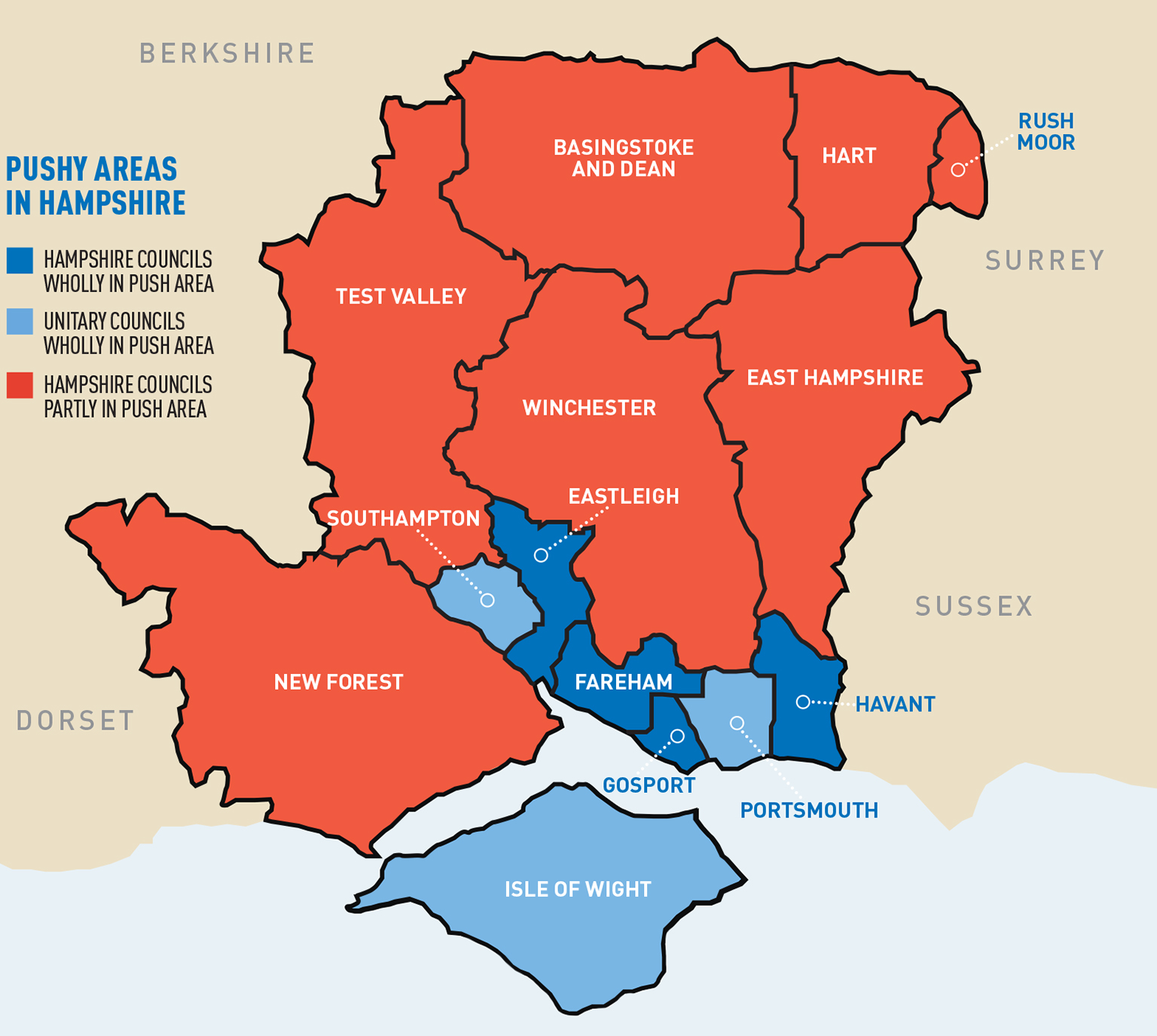
Blaming the Saxons for rows over economic development may be unproductive, but as the government seeks to boost growth through devolution, it looks set to use their historic counties as units.
Sadly, Alfred the Great’s contemporaries did not foresee modern commerce and today it’s an unusual place whose economic footprint neatly fits within a county boundary.
Should devolution in Hampshire cover the whole county, or just its urban south?
This key dispute is not party political, nor about the historic rivalry between Portsmouth and Southampton, but between the conurbation and the rest of Hampshire.
Economic development agency PUSH – Partnership for Urban South Hampshire – has long handled cross-boundary planning issues, and it originally wanted to become a combined authority with devolved powers, arguing that the south’s economy was distinct from the county’s rural areas.
This went down badly elsewhere in Hampshire, not least because it would have meant sawing the county and four districts in half since some but not all of their areas are covered by PUSH.
Eventually, Hampshire county council, its 11 districts, Portsmouth and Southampton city councils and the Isle of Wight jointly bid to ministers to become a combined authority.
The devolution bid includes improving skills, building more homes, infrastructure investment and public service reforms.
If ministers grant them the powers, the councils have committed to deliver the local plan target of 76,000 new homes by 2026 – two years early – and to create new enterprise zones and a 10-year fund to improve transport infrastructure.
There is agreement, though, that economic development in the PUSH area is a priority because of its lagging performance.
Most local enterprise zone partnerships talk up their area, but the Solent EZ bluntly states: “Solent is ‘punching below its weight’ in terms of foreign direct investment performance.”
Not only that, it suffers from low skills and productivity compared with the rest of the South East.
So, can councils put aside their differences to deliver something better?
Fareham borough council leader and chair of PUSH, Sean Woodward, points to the proposed Welbourne new town as an example of a project delayed by the lack of local powers.
“It needs a major improvement of junction 10 of the M27 and we don’t have the powers to do that,” he says.
“At the moment, Highways England looks after, or rather doesn’t, the motorway and trunk road network and it looks after it in terms of its network, not in terms of local economic development.
“We cannot get Welbourne going without a junction that gives easy motorway access.”
“Hampshire has not got its act together in the way that, say, Manchester has and whether the combined authority can change that only time will tell”
Fareham is active in economic development having taken over the Daedalus enterprise zone from the Homes and Communities Agency and reinstated the old RAF runway to attract aviation businesses.
“How many councils build runways?” Woodward asks. “But we need the powers to do more.”
Portsmouth city council leader Donna Jones says: “The combined authority will have the very clear task of accelerating housebuilding, which means that we want to control the funds for infrastructure.”
Portsmouth plans to build 2,500 homes at Tipner, and has had Horsea Island transferred from the Ministry of Defence for redevelopment. “But that needs a bridge off the M275,” Jones says.
She points to a local economy with strengths based on maritime industries and their supply chains, given the long association with the Royal Navy, and aerospace with the presence of Airbus.
However, the armed forces links may be a mixed blessing says Gary Jeffries, managing director of local agent Hughes Ellard and chair of the Solent LEP.“The challenge for the area is that productivity is below the South East average,” he says.
“It’s overdependent on the public sector, mainly the MoD in Portsmouth, and needs to attract higher-skilled industries. The Solent area does quite well for intermediate-level skills but for [higher technical and professional] ‘level 4’ skills it does less well.”
Woodward says: “South Hampshire has long underperformed the South East as productivity is poor and there are skills issues. We should up-skill people here rather than attract people in from outside with the implications that has for housing.”
James Brounger, regional managing director for CBRE, agrees. He says: “We do relatively badly in graduate retention and that needs to be addressed.
“I don’t think the reason is lack of affordable homes because by South East standards we are relatively cheap. It may be there are not the job opportunities.”
He cities prevailing low rents sustaining a shortage of office and industrial buildings in Southampton.
“For offices the fundamental issue is that rents are not high enough, even if you have a prelet,” Brounger says.
“Office rents need to rise by 20-25% for things to happen, but that is unlikely to happen quickly.”
“It’s only 18 miles between Portsmouth and Southampton but it can take an hour to drive and we need to fix that”
Jeffries thinks the state of the area’s M27 spine road holds its economy back. “We generally need to enable people to travel east to west more easily and install smart motorway measures to better manage traffic flows,” he says.
“It’s only 18 miles between Portsmouth and Southampton but it can take an hour to drive and we need to fix that.”
Barton Willmore partner Robin Shepherd hopes the combined authority will tackle housing supply.
He says: “Housing has not kept up with economic growth and it could be that the combined authority will resolve the problem where you have a number of small authorities which, when the cities say they need to expand housing there, reply, ‘Oh no you don’t’.”
On the other hand, it could make things worse. “You could have a problem with districts where one end is in the conurbation and the rest is rural, and find rural councillors are making decisions about investment in the urban area.”
Shepherd too feels the area has been economically left behind.
“It’s not got its act together in the way that, say, Manchester has and whether the combined authority can change that only time will tell,” he says.
Hampshire county council leader Roy Perry believes the “county-wide” scale of the eventual devolution bid is the right one. “I know in the early days there was a bit of small-scale thinking of a small south Hampshire bid, but I am pleased to say that is now behind us,” he says.
Perry says that while south Hampshire has the maritime sector, “there are more similarities and interdependencies than differences between the north and south of the county, and there is no single right economic geography that defines an effective economic area”.
There are plenty of plans to use devolved powers to help south Hampshire’s economy, but will harmony reign with the rest of the county?
 Building a new town
Building a new town
Welbourne is to deliver 6,000 homes, plus associated schools, retail and community facilities, and employment space for 6,000 jobs by 2035-36 in a small greenfield new town north of Fareham.
This is planned to meet the borough’s housing need for the medium term. But its viability is contingent on an upgraded M27 junction 10.
Local councils and Highways England disagree over when this can be built.
The offshore economy
The Isle of Wight is perhaps not a property development hot spot, but it makes an important contribution to the south Hampshire economy, of which it is treated as part.
Jeffries says: “It’s important as it has some world-class organisations, in particular manufacturers of composites and economic entities based on sailing and maritime. We are investing in Red Funnel ferries for better links.”
Shepherd says the island “takes in a lot of money from sailing events and has its own economy based on that and tourism, but the south of the island isn’t really part of the urban region”.











